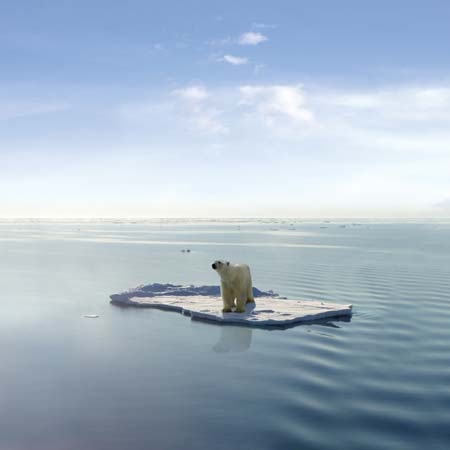Remember all the hoopla about polar bears facing a grim future as Arctic warming eliminates the pack ice that the bears live on? Polar bears went viral and became the poster children for the impending loss of biodiversity in the face of climate change.
It all started when biologist Charles Monnett, employee of what was then called the Minerals Management Service, reported with a colleague in the peer-reviewed journal Polar Biology that four dead polar bears had been sighted in the Beaufort Sea for the first time in at least 17 years of observations. This coincides with a well-documented and widely reported long-term retreat of the Arctic ice pack on which the polar bears live.
Well, Dr. Monnett has now been placed on “adminstrative leave” pending an internal investigation into “integrity issues,” according to the NYT:
‘On Thursday, the Public Employees for Environmental Responsibility, which defends workers in the environmental field against what it regards as abuses, filed a complaint accusing the ocean energy bureau of scientific misconduct. It said that in banning Dr. Monnett from conducting scientific work, it had disrupted his research, including at least one continuing study of polar bears . . .
Transcripts of an interview with Dr. Monnett posted online by the public employees group indicate that the bureau’s inspector general is focusing on calculations that Dr. Monnett made to estimate a 75 percent mortality rate among bears caught in a mid-September storm in the open sea . . .
The polar bear report had been approved by Dr. Monnett’s superiors at the bureau, which until last year was called the Minerals Management Service. But the approval was short-lived. In the interview transcript, Dr. Monnett is quoted as saying that “we got blasted, you know, really hard, by the agency” after the reports of the drowned bears circulated.
At another point, he said of his superiors, “They don’t want any impediment to, you know, what they view as their mission, which is to, you know, drill wells up there” and “put areas into production.”’
You may perhaps recall the former Minerals Management Service, which gained notoriety after it was revealed that regulators employed by the agency were having debauched orgies with the lobbyists for the oil companies they were supposed to be regulating. Shortly after that brouhaha, the agency was strategically renamed the “Bureau of Ocean Energy Management, Regulation and Enforcement”.
I had the “audacity of hope” that we were finished with this sort of political repression of scientists after eight years of the Bush administration. “Yes, we can!”, I thought. Can we? I’m beginning to wonder.

Leave a Reply